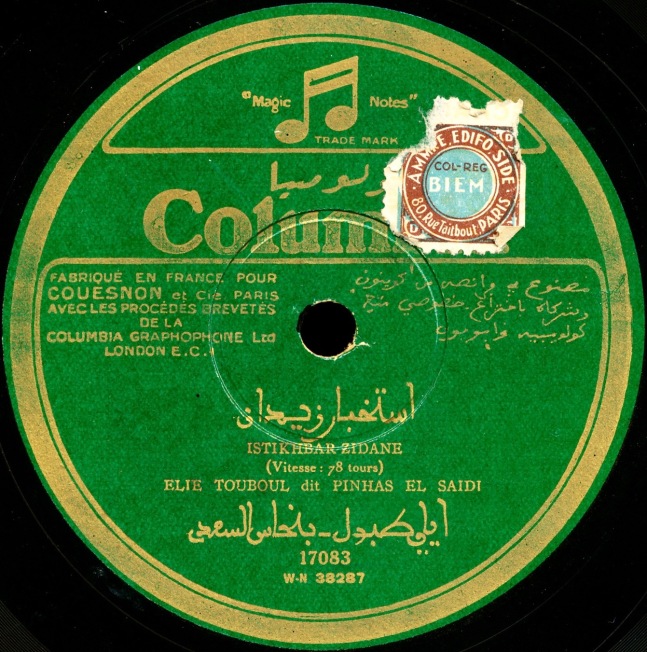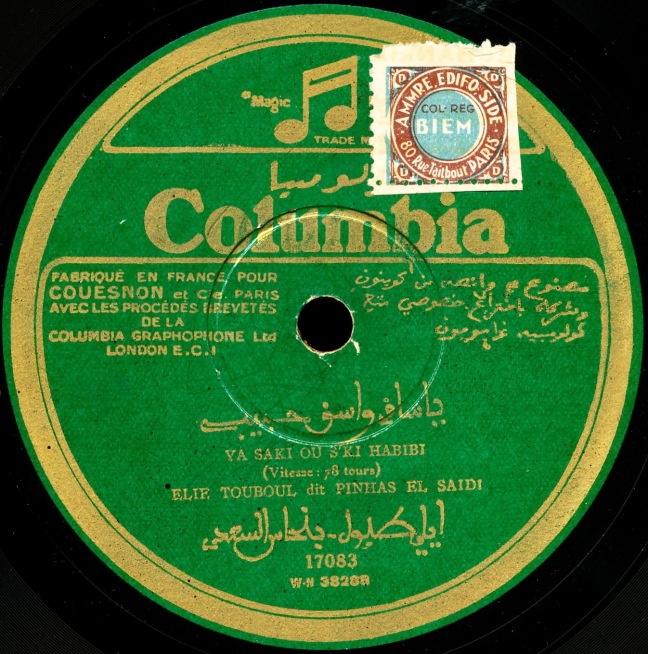The early-to-mid twentieth century Algerian recording artist Elie Touboul (1894-1947) and his music illuminate in more ways than one. To begin with, Touboul, who was also known as Pinhas El Saidi[1] and most commonly as Cheikh Pinhas, hailed not from one of the major urban centers that scholars of music and aficionados tend to focus on––but from Mostaganem, a medium-sized city some 100 kilometers east of Oran. In this way, Cheikh Pinhas’s voice serves to remind of the vast and sometimes little-known universe of Algerian music-making that existed outside of Algiers and other principal locales.
What little is known of Cheikh Pinhas has mostly been surfaced by Hadj Miliani in his chapter on Algerian Jewish musicians and stage actors in the volume Jewish Culture and Society in North Africa (ed. Emily Gottreich and Daniel J. Schroeter, 2011). Miliani, drawing on Rashid Muhammad Ibn Tunis’ critical study of history and culture in Mostaganem (1998), demonstrates that far from elusive, Cheikh Pinhas was among his city’s most celebrated musicians during the interwar years (along with his co-religionists Meyer Reboah and Isaac Benghozi).[2] As devoted as the people of Mostaganem were to Cheikh Pinhas, he was to them. After the city suffered a devastating flood in 1927, the musician composed and then recorded a song on the Columbia label to commemorate the tragedy and honor the victims.[3] The recording of “Ya saki ou s’ki habibi” featured in this post appears to hail from those 1928 sessions. Here, again, Cheikh Pinhas and this particular record of his prove revelatory.

“Ya saki ou s’ki habibi,” as Algerian musician and mélomane Ouail Laabassi explained to me in brilliant detail, represents a song-text from the core of the Andalusian nuba and is specifically associated with the modes of raml maya and maya. What makes this recording of “Ya saki ou s’ki habibi” so striking––in addition to the vocals and the exquisite piano––is that it is performed not in raml maya or maya but in the mode of zidane. And while the technique of employing a single song-text across multiple melodies was known in Cheikh Pinhas’ time, it largely fell out of favor after the Second World War. In other words, for those familiar with “Ya saki ou s’ki habibi,” this 1928 recording by a Mostaganemi musician likely represents the first time they have heard it sound like this. Indeed, Laabassi quickly matched the melody employed by Cheikh Pinhas in his performance of “Ya saki ou s’ki habibi” to that which is usually paired with another Andalusian song-text: “Ya nas djarat li gharayeb.”
In order to begin to fill out his biography, it need be noted that Cheikh Pinhas continued to record in the postwar period. In addition to his own sides made for Odéon, he also recorded in duet on the label with the famed Tlemcani musician Elie Bensaid (1880-1972).
Notes
Label: Columbia
Titles: Istikhbar Zidane [استخبار زيدان] and Ya saki ou s’ki habibi [يا ساقي واسقي حبيبي]
Artist: Elie Touboul dit Pinhas El Saidi
Issue numbers: 17083 [both sides]
Matrix numbers: W-N 38287 and W-N 38288; 39297 and 39298
Date of Pressing: c. 1928
[1] The name Saidi points to his family’s origins in Saida, Algeria.
[2] Miliani, “Crosscurrents: Trajectories of Algerian Jewish Artists and Men of Culture since the End of the Nineteenth Century,” in Jewish Society and Culture in North Africa, Indiana University Press, 183.
[3] Ibid.

Very good job, hope to know more soon.
LikeLiked by 1 person
Bonjour
je découvre enfin cette page avec émotion parce que j’en ai entendu parlé toute ma vie et je ne l’ai pas connu j’ai hérité de son violon alto et les entendre tous les deux me procure joie fierté et émotions intenses
je suis son petit fils et je porte son nom et son prénom
Mon père me disait qu’ il y eut d’autres enregistrements chez Odeon Columbia
comment les retrouver merci a toutes les personnes capables de donner des indices ou une piste ceci est une bouteille à la mer……….nous sommes de nombeux descendants de CHEIKH PINHAS EL SAIDI ……et bon nombre sommes musiciens
Paul Elie TOUBOUL ( Lyon Dardilly France )
LikeLiked by 1 person
C’est émouvant de découvrir par la voix mon grand-père que moi aussi je n’ai pas connu et comme lui je porte son prénom.
En découvrant ces chansons, je me souviens de ces notes de piano qui me rappellent aussi ma mère aussi disparue qui reprenait au piano les compositions de son père
Oui je suis le petit fils d’Elie Pinhas Touboul , le père de ma maman.
Ce fût un réel plaisir de lire ces quelques lignes qui rendent hommage a l’artiste renommé qu’était mon grand-père.
Merci à vous pour votre travail
Jean-Pierre, Elie Darmon
LikeLiked by 1 person